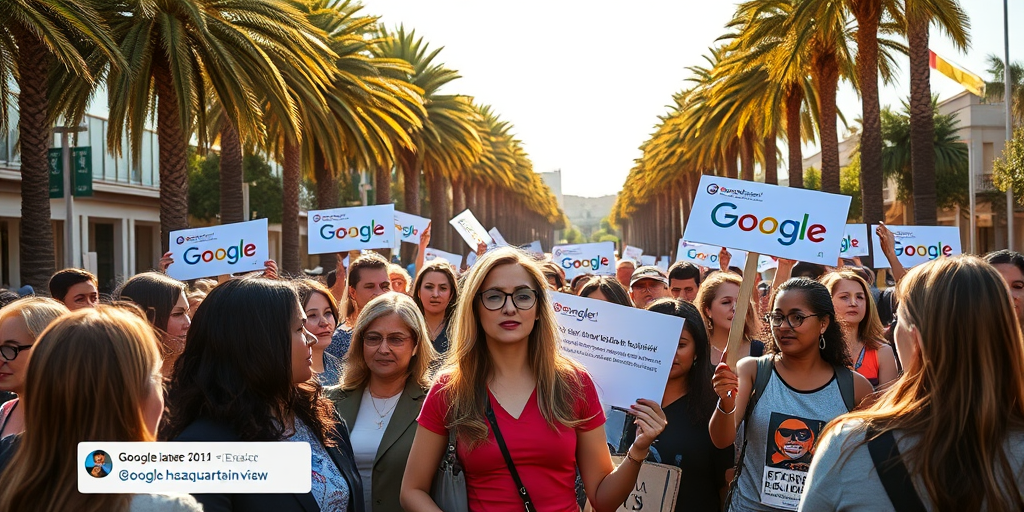**Google’s Termination of Women Techmakers Program Sparks Debate over Diversity in Tech**
In a move stirring considerable discourse within the tech industry, Google announced the cessation of its Women Techmakers program, marking a significant rollback in its diversity initiatives. Once a beacon for supporting women in technology, the program’s termination has not only raised eyebrows but also posed critical questions about the future of diversity in tech sectors.
**Key Changes at Google**
The termination of the Women Techmakers program aligns with a broader shift at Google, reflecting a strategic deprioritization of diversity-focused initiatives. Launched as a hopeful step towards gender parity in a traditionally male-dominated industry, the program has been instrumental in providing resources, visibility, and community for women technologists. However, despite its prominent role, Google has chosen to wind down the program without providing explicit reasons, sparking discussions about the company’s commitment to diversity.
This decision arrives at a time when the tech giant, like many others, is reassessing its corporate strategies amid pressures and criticism over the effectiveness of diversity programs. With skepticism surrounding the tangible impacts of such initiatives, Google’s actions may foreshadow broader industry trends.
**Implications for the Community**
Locally, the news resonates deeply. For communities reliant on tech jobs and innovation, the dissolution of supportive programs like Women Techmakers represents not just a corporate shift but a potential step back in efforts to cultivate an inclusive tech environment. The program has previously served as a conduit for women seeking to break into the tech world, offering mentorship and networking opportunities critical to their career advancement.
Emma Garcia, a software engineer from a renowned tech hub in San Francisco, shared her concerns: “Google’s Women Techmakers was a stronghold for connecting with other women in tech. Without these avenues, it feels like we’re losing important ground. Diverse teams challenge the norm and drive innovation, and programs like these are vital.”
For local tech companies and startups exploring a diversity-driven model, Google’s decision could influence hiring practices and workplace culture.
**Reactions and Perspectives**
Critics of the rollback argue such steps may undermine ongoing efforts to create equitable workplaces. Advocates for diversity assert that although programs might not always yield immediate results, their long-term presence is crucial for cultural shifts within industries notorious for their gender gaps.
On the other hand, some industry voices suggest that the changing dynamics of diversity programs require evolved strategies. Dr. Lauren Phillips, an expert in corporate diversity at Stanford University, emphasized, “What’s necessary now is a re-examination of these initiatives to ensure they’re impactful. This might involve innovative approaches, not necessarily less commitment to diversity.”
**Historical Context and Future Outlook**
Reflecting on past local initiatives, the Bay Area has been a front-runner in promoting diversity in tech. From grassroots organizations launching coding boot camps for women to partnerships designed to elevate marginalized voices, the region holds a rich tapestry of efforts aimed at fostering inclusive environments. The rollback of a high-profile program like Women Techmakers casts a spotlight on these foundational initiatives and raises questions about sustaining momentum amidst evolving corporate policies.
The dissolution prompts speculation about its rippling effects on future diversity endeavors. Could this signal a reduction in similar programs across companies? Analysts highlight the critical balance businesses must maintain between demonstrating corporate social responsibility and addressing concerns of impact versus cost.
**Resources for Continued Support**
For those within the community seeking continued support and resources post-Women Techmakers, several local organizations remain steadfast in their mission. Groups such as Women Who Code, Black Girls Code, and the AnitaB.org have expressed renewed commitment to their programs, determined to fill any potential void left by Google’s decision.
Furthermore, Google has indicated that other internal resources are available, although lacking the global reach of a structured program like Women Techmakers. Local industry forums and tech meetups encourage collaboration and knowledge sharing, emphasizing that community-driven efforts continue to hold significant value.
**Concluding Thoughts**
As the conversation around Google’s rollback reverberates through the tech industry, it serves as a critical juncture for dialogue and reflection. Understanding the future dynamics of diversity in tech is paramount for stakeholders at all levels. The local impact is palpable, reinforcing the importance of sustained efforts to advocate for inclusivity within the tech ecosystem. As the narrative unfolds, the enduring question persists: how will tech companies balance corporate objectives with the pressing need for diversity and inclusion?







